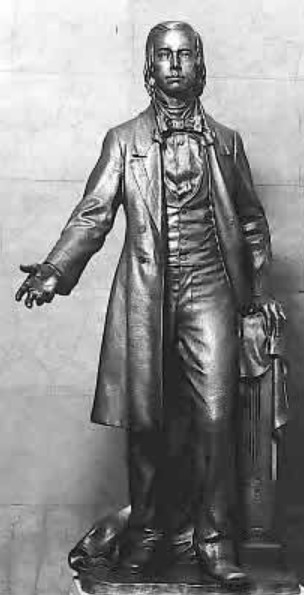Thomas Starr King, the orator who saved the nation

Statue of Thomas Starr King located in Sacramento Civil War Memorial Grove in Capitol Park
Thomas Starr King did more than anyone else to bind California firmly to the Union. Abraham Lincoln considered King solely responsible for keeping California from becoming a separate republic, but we cannot blame him too much - it seemed like a good idea at the time.
After his father died when he was 15 King had to abandon formal schooling, and teach himself for five years while he supported his family. At the age of 20 he took over his father's former pulpit and embarked on a career of public speaking that took him all over New England.
In 1860, when he was 34, he was called by the First Unitarian Church of San Francisco and came West. He visited Yosemite and was so astonished and moved by it that he published letters in Boston Evening Transcript, preached a series of lectures on Yosemite's magnificence, and worked with Frederick Olmsted to have it set aside as a preserve.
During the Civil War King teamed up with Bret Harte and read Harte's patriotic poems as part of his speeches. He spoke to thousands of people and convinced them that California must not be stained with slavery or rebellion, that the Bear flag must have "no treacherous threads of cotton in its warp". He also organized the Pacific branch of the Sanitary Commission (a predecessor of the Red Cross) and raised over one and a half million dollars for wounded Northern soldiers, 20% of the total money raised across all states.
A life-long passionate abolitionist, Starr King was a Republican back when that was a good thing. In the 20th century the Republican party's principles changed, and in 2006 a cheap, whey-faced, dirty-minded prig from South California led the drive to replace King's statue in the State Capitol with Reagan's saying that he "wasn't sure" who King was. Those of us who are not Republicans - we remember.
After his father died when he was 15 King had to abandon formal schooling, and teach himself for five years while he supported his family. At the age of 20 he took over his father's former pulpit and embarked on a career of public speaking that took him all over New England.
In 1860, when he was 34, he was called by the First Unitarian Church of San Francisco and came West. He visited Yosemite and was so astonished and moved by it that he published letters in Boston Evening Transcript, preached a series of lectures on Yosemite's magnificence, and worked with Frederick Olmsted to have it set aside as a preserve.
During the Civil War King teamed up with Bret Harte and read Harte's patriotic poems as part of his speeches. He spoke to thousands of people and convinced them that California must not be stained with slavery or rebellion, that the Bear flag must have "no treacherous threads of cotton in its warp". He also organized the Pacific branch of the Sanitary Commission (a predecessor of the Red Cross) and raised over one and a half million dollars for wounded Northern soldiers, 20% of the total money raised across all states.
A life-long passionate abolitionist, Starr King was a Republican back when that was a good thing. In the 20th century the Republican party's principles changed, and in 2006 a cheap, whey-faced, dirty-minded prig from South California led the drive to replace King's statue in the State Capitol with Reagan's saying that he "wasn't sure" who King was. Those of us who are not Republicans - we remember.
